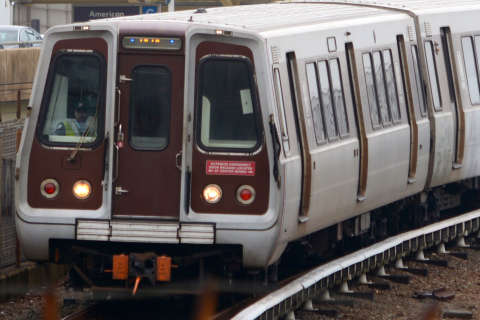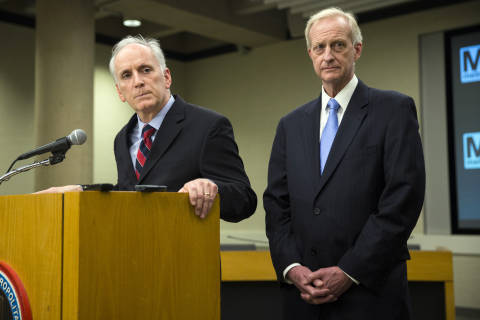FAIRFAX, Va. — Schools, roads, public safety and other key budget needs could be squeezed out by ballooning needs at Metro after years of neglect, Nothern Virginia leaders were warned Tuesday.
New estimates put Loudoun County’s total costs for fiscal year 2020 around $50.8 million, $31.5 million higher than the 2012 estimate used when the Board of Supervisors gave final approval to get the Silver Line to Dulles International Airport and Ashburn. In fiscal year 2025, the total for Loudoun County could rise to $82.2 million, an increase of $60.7 million above projections. The estimates still need to be revised to reflect the fact that Loudoun opted out of Metro’s bus system, and so will not pay that portion of the costs.
County staff said the increases are driven by the major expansion in Metro’s renovation and improvement projects since the scale of Metro’s problems was finally acknowledged over the past year.
“The WMATA 2012 Model assumed a level of spending consistent with prior budgets approved up through that time,” a staff report read. “In the intervening years, significant failures have occurred, including fatalities that have highlighted the impacts of long-term deferrals of capital needs. The WMATA 2012 Model relies on past operation and capital budgets that never built-in completely the needs and requirements for both safety and reliability.”
Fairfax County Executive Ed Long faces the same issues in his budget plans.
“We ignored the maintenance of the system for so long; now we’re playing catch-up. So, instead of having relatively modest increases each year to deal with maintenance, we’ve put all our eggs in one basket and now we have a huge number. And any time you deal with a budget item that you put all your eggs in and you’re trying to deal with one huge number, it’s a challenge. And that’s where we are right now and that’s what makes it even more difficult,” he said.
The county budget he proposed Tuesday is already thin on additional services, does not fund key priorities such as police reforms, and provides less of an increase than the school system requested.
The fluctuations in Metro costs from year to year, and the mid-term burden on local taxpayers, could be eased if the projects were funded through bonds, the Loudoun County staff report said, but that would require the backing of a dedicated revenue source, which has proven controversial.
For now, Loudoun County is set to put $12 million from a local portion of state tax revenue in 2021, with $13 million in future years combined with $13 to $15 million in general obligation bonds through fiscal year 2026. The county has also begun building revenue from a special tax district around the new stations that are expected to open in mid-to-late 2020.
In Fairfax County, Long said the financial burden from Metro can be handled for fiscal year 2018, which begins this summer, but it becomes a major problem after that. Metro has already proposed fare hikes and service cuts starting this summer, and Long is concerned about additional problems in coming years if Metro loses current federal funding or if President Donald Trump changes federal transit funding policies nationwide.
“[Fiscal year] ’19 and future years will require significant increases in county contributions which simply are not sustainable with the revenues that we have now, so there’s a lot of discussion that’s going to have to take place among ourselves and also the region as we go forward to figure out a long-term funding solution for Metro,” Long told the Fairfax County Board of Supervisors Tuesday.
“Every jurisdiction is grappling how to meet that Metro contribution, and I feel that folks will figure out a way to come up with the funds for ’18, but I think we’re all in the same boat going forward: We just don’t have the funds to sustain those increases based on real estate basically staying flat, and that’s going to be a challenge for all of us,” he added.
Fairfax County Board Chairman Sharon Bulova is leading a regional task force of elected officials that hopes to find some kind of solution for Metro capital and operating funding, which has centered around a dedicated regional tax of some kind.
Supervisor Pat Herrity said Fairfax County should be taking an even stronger leadership role as the largest Virginia jurisdiction that is a part of the Metro Compact.
“This can’t be a discussion about more money if it doesn’t include fundamental reforms,” Herrity said.
“As a Republican, regional funding source kinda scares me away, but I’m ready to come to the table and support regional funding sources if we get fundamental reforms in the way the system works,” he said.
Other supervisors cited the ongoing discussions of changes at Metro including costs, governance and reliable service, but Fairfax County’s Metro Board member, Supervisor Cathy Hudgins, said safety must come first, which likely will require more money.
“When the federal government tells you that you must be a safe agency … I think we want it to be safe. Because if it’s not safe it’s not reliable; if it’s not reliable, it’s a cost that doesn’t contribute to the well-being,” Hudgins said.
Supervisor Jeff McKay said the problem could get worse if Virginia legislators do not address a state transit funding issue: Transit capital bonds are running out.
“Part of Metro’s problem is funding; part of it is management. Both of those issues need to be addressed. They have no sustainable revenue source. To make matters worse at the state level, the state is facing a fiscal cliff,” McKay said.
Fairfax County expects to contribute $61 million in capital funds and $20 million in operating money for the coming fiscal year’s Metro budget.
“It’s a huge dollar issue, but it’s also an economic development issue because Metro has to get fixed,” Supervisor John Cook said. “We can’t shut it down and expect the economy to grow, and we go back to the beginning — if this economy doesn’t grow, nothing else can happen.”







